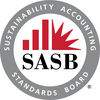
Sustainability Accounting Standards Board (SASB)
About (Sustainability Accounting Standards Board (SASB))
The Sustainability Accounting Standards Board (SASB) is an independent nonprofit organization that develops and disseminates industry-specific sustainability accounting standards. SASB's mission is to provide investors and companies with a framework for integrating sustainability factors into their decision-making processes.
SASB standards are designed to help companies identify, manage, and communicate financially material sustainability information to investors. They focus on the disclosure of sustainability risks and opportunities that are most relevant to a particular industry. SASB standards cover a wide range of sustainability topics, including environmental, social, and governance (ESG) factors.
Key features and principles of SASB standards include:
Industry-specific focus: SASB recognizes that different industries face distinct sustainability challenges and opportunities. Therefore, it has developed standards tailored to specific sectors, such as healthcare, financials, technology, and transportation, among others.
Materiality-driven approach: SASB standards prioritize the disclosure of information that is likely to have a significant impact on a company's financial performance. By focusing on financially material sustainability factors, SASB aims to provide decision-useful information for investors.
Quantitative and qualitative metrics: SASB standards provide both quantitative and qualitative metrics to guide companies in reporting on their sustainability performance. These metrics help companies track and measure their progress and enable investors to compare performance across companies within the same industry.
Integration with financial reporting: SASB encourages the integration of sustainability information into mainstream financial reports, such as annual reports or financial filings. This integration facilitates a more comprehensive understanding of a company's overall performance, risks, and opportunities.
Investor-focused approach: SASB standards are developed through a rigorous process that involves extensive research, industry engagement, and public input. They are designed to meet the needs of investors by providing decision-useful information for assessing a company's sustainability performance and its potential impact on financial performance.
SASB standards are not mandatory requirements, but they are gaining traction globally as investors increasingly consider ESG factors in their investment decisions. Companies voluntarily adopt SASB standards to enhance their ESG reporting and respond to investor demands for transparent and comparable sustainability information.
It's important to note that SASB is one of several organizations and frameworks working on sustainability reporting standards. Other prominent frameworks include the Global Reporting Initiative (GRI) and the Task Force on Climate-related Financial Disclosures (TCFD).